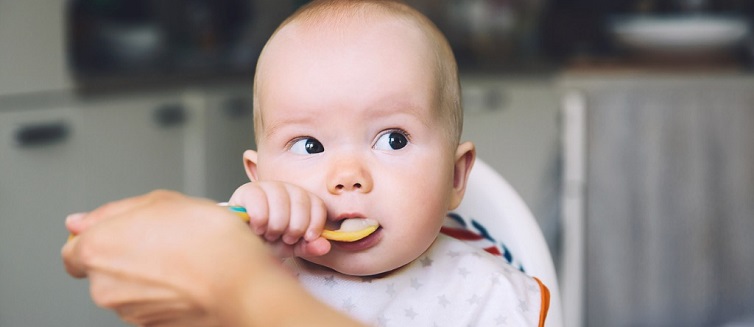When can babies have peanut butter? Why can’t babies have honey? When can babies eat eggs? These are big questions for parents concerned about food allergies and food dangers for their children 12 months or younger. Some foods, like peanuts and eggs, are potential allergens, whereas other foods, like honey, pose food safety risks.
Allergies in Children and Infants
About 4 to 6 percent of kids have food allergies, according to the Centers for Disease Control and Prevention (CDC), and 90 percent of the most serious allergic reactions in the U.S. are to these eight foods: peanuts, milk, eggs, fish, soy, wheat, tree nuts, and crustacean shellfish. Reactions range from mild to severe and can start at any age, even if the food was easily tolerated before.
Allergic reactions to food occur when the immune system treats a specific food as harmful to the body. In response, the body heightens its natural defenses, producing allergy symptoms. Symptoms can include hives, difficulty breathing, an upset stomach, a rash, swelling, and nausea.
However, steadfastly avoiding any potential food allergens can seriously — and possibly unnecessarily — restrict your child’s diet. And by gradually introducing your child to potential allergens, like peanuts, they can develop immunity.
Never Miss a Beat!
Subscribe to Our HealthBeat Newsletter!
Thank you for subscribing!
You can now select the specific newsletters you'd like to receive.
You are already subscribed.
Subscribe to more newsletters in our email preference center.
Sorry, an error occurred. Please try again later.
Get Healthy Tips Sent to Your Phone!
When Can Babies Have Peanut Butter?
Of course, you want to make sure the peanut is not a choking hazard, so peanut butter might be a better choice. The New England Journal of Medicine published a study showing that introducing peanuts earlier into the diets of infants at high risk of developing peanut allergies lowered the frequency of peanut allergies.
When Can Babies Have Cow’s Milk?
Of course, not all mothers can or want to breastfeed. Traditional baby formulas contain cow’s milk proteins, but there are alternatives, including soy-based formulas. A pediatrician can advise you on these alternatives. The CDC recommends beginning to transition from formula to cow’s milk when the child is between 12 and 24 months old, though a baby may also eat other dairy products during their first year.
When Can Babies Eat Eggs?
Why Can’t Babies Have Honey?
You should introduce new foods to your baby one at a time, a week or two apart, to watch for allergic reactions. As with all food issues, it’s a good idea to talk to your pediatrician about any concerns. For more information or to schedule an appointment, call the UPMC Children’s Hospital of Pittsburgh at 412-692-6438.
About UPMC Magee-Womens
Built upon our flagship, UPMC Magee-Womens Hospital in Pittsburgh, and its century-plus history of providing high-quality medical care for people at all stages of life, UPMC Magee-Womens is nationally renowned for its outstanding care for women and their families.
Our Magee-Womens network – from women’s imaging centers and specialty care to outpatient and hospital-based services – provides care throughout Pennsylvania, so the help you need is always close to home. More than 25,000 babies are born at our network hospitals each year, with 10,000 of those babies born at UPMC Magee in Pittsburgh, home to one of the largest NICUs in the country. The Department of Health and Human Services recognizes Magee in Pittsburgh as a National Center of Excellence in Women’s Health; U.S. News & World Report ranks Magee nationally in gynecology. The Magee-Womens Research Institute was the first and is the largest research institute in the U.S. devoted exclusively to women’s health and reproductive biology, with locations in Pittsburgh and Erie.
